Peter MALONE
Saturday, 18 September 2021 20:00
Eden

EDEN
France, 2014, or 131 minutes, Colour.
Felix de Givry, Pauline Etienne, Vincent Magaigne, Hugo Conzelman, Zita Hanrot, Roman Kolinka, Vincent Lacoste, Greta Gerwig, Brady Corbett.
Directed by Mia Hansen- Love.
Eden is a semi-autobiographical film by celebrated French director, Mia Hansen- Love whose films included The Father of My Children, Goodbye, First Love, L’ Avenir. The screenplay was co-written with her brother, Sven Hansen- Love, on the the central character, Paul, is modelled – and his love of music, his work as a DJ, his physical and moral collapse with drugs, his commitment to the world of music, his recovery.
The film traces the French music world, rock, punk, garage, from the 1990s to the 2010s. It is principally a film for those interested in this music world and its extension to New York City at the end of the 1990s. There is quite a range of music played, a range of bands and individual musicians.
The film shows enthusiasm, but also shows a downward spiral, disappointments, relationships and breaking relationships, the world of drugs, the suicides.
While the film has a strong French cast, the American connections are reinforced by the presence of Greta Gerwig and Brady Corbett.
For those who admire this music scene and the director, but friends of the director might find the detailed focus on this music world somewhat alien at times.
1. The contemporary music in France from the 1990s to 2010? The trends? The different styles of music? Performance, DJs, composers, bands and instruments, venues for playing? France, Paris, New York?
2. The director, films? The memories of her childhood? Collaborating in writing the screenplay with her brother as the model for the character, Paul?
3. The range of songs played throughout the film?
4. France in the 1990s, young adults, work, music, bands and nightclubs, drink and the prevalence of drugs? The effect at the time?
5. Paul, based on the director’s brother, his home, with his mother (and asking for money later, acknowledging his addiction, his mother’s response)? His work, writing? His interest in music? His work as a DJ, skills, the music, enjoyment, the musicians? His collaboration with his friends? The collaboration with Stan and the formation of Cheers? His collaboration with Guy- Man, Thomas? The progress throughout the 1990s? His relationship with Louise? The relationship and momentum, breaking up, the return to New York? Later meeting her, the meeting with Larry, the story of her abortion?
6. Invitation to go to New York, the invitation to Cyril, his staying in France, concentrating on his comic and design? The shock of his suicide?
7. The impact on Paul, his return to France, collapse, with his mother? The meeting with the young girl, the comments about the music she listened to? His being part of the past? His new job, salesmen? The night courses?
8. The range of people in the music industries? France and the US? Fashions, tastes, “garage” music, punk, and its varieties?
9. Paul, his character – and his being saved in real life, the director’s brother and his music, collaboration with the sister of the screenplay, able to take stock of his life?
Published in Movie Reviews
Published in
Movie Reviews
Tagged under
Saturday, 18 September 2021 20:00
Lost River
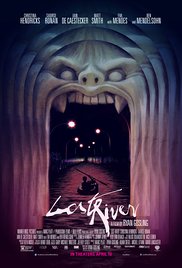
LOST RIVER
US, 2014, 95 minutes, Colour.
Christina Hendricks, Iain De Caestecker, Saoirse Ronan, Matt Smith, Ben Mendelsohn, Eva Mendes, Barbara Steele, Landyn Stewart, Torry Wigfield.
Directed by Ryan Gosling.
Lost River is rather an exotic film – especially when one realises that it has been directed by actor, Ryan Gosling. It is a blend of the real and the surreal – with, perhaps, the surreal winning out, in its delineation of characters, in the situations, in its cinematic visual style, of light and darkness, shadows with sinister overtones.
The film is set in Detroit, in a dingy part of the town, a derelict house on the outskirts next to another derelict house, in the city streets, a club patronised by rather seedy men where the acts are all sadomasochistic.
The film has a very good cast with Christina Hendricks as a mother, with two sons, trying to hang on to the house they live in which was bequeathed to her but in need of a loan to keep going – with a visit to a banker, played in his sinister manner by Ben Mendelsohn, who gets the mother a job in the sleazy club, where she is coached in her acts by Eva Mendes.
In the meantime, the older son is put upon by the local bully who is not above cutting off the lips of his henchmen for not carrying out his orders properly. Next door is a young woman, played by Saoirse Ronan, who lives with her demented grandmother who watches her wedding video over and over, and lives with a pet rat. The grandmother is played by the celebrated veteran of many a horror film from the 1960s in Italy and in Britain, Barbara Steele.
The title refers to the inundation of a town to form a local reservoir and its being called Lost River, with a curse that only the head of a monster in the river will overcome the curse – which is fulfilled, ironically, at the end of the film.
Rather derided critically when it first came out, Lost River seems to be moving toward some cult status.
1. The mixed responses to the film? To Ryan Gosling as director? The negatives, later admiration and leading to a reputation as a cult film?
2. The description of neo-noir, the surreal fantasy? The blend of the real and the surreal in look, plot, characters, editing, score?
3. Ryan Gosling, his career, his first film as director?
4. The strong and varied cast? International?
5. The images of Detroit, dingy areas, inner city dingy, the derelict house, the exteriors, the street, the visual impact, light and darkness?
6. The focus on Billy, on Bones and Franky? Billy as mother, the heritage of the house, her wanting to keep it? Her relationship with her sons?
7. Bones, his age, close to Franky, stealing the copper piping, Bully and his wanting the copper, his threats, Bully seeing Bones take the copper, Bones running and leaving it, later recouping it? The threats from Face?
8. Billy, going to the bank, the issue of the loan, Dave and his attitude as banker, as man, refusing the loan? Billy wanting to keep the house, the need for the loan, the inheritance from her grandmother? The need for a job, Dave giving the card, not explaining the job, Billy going to the address, discovering it was a burlesque show?
9. The show, Cat, Dave and his presence, ownership, the clientele? The nature of the shows, sadomasochist, the MC, gory, the reaction of the audience? The make up, Cat and her help, support for Billy? Billy, the make-up, performance, the blood and the stabbings? The work in the basement, the shells, the women locked in, the men and their behaviour? Sexuality?
10. The threats to the house, marked as derelict? The effect on Billy, on the boys?
11. The character of Rat, her pet rat, Nick? Living with her grandmother? Her age, her grandmother watching the wedding video over and over? Her mind gone? Lament? Rat looking after her?
12. Brett and Bones, discovering the road leading to the lake, Rat telling the story of the town, submerged, the reservoir? The name of Lost River? The curse – and the mission to find the head of the beast to release the curse?
13. Rat and Bones, their friendship, going to the dance, Bully confronting them, Face – and Bully having cut off his lips? Subservience to Bully?
14. Bully, Rat intervening, getting the lift, going to the door, Bully and his killing Nick, the rat?
15. Billy taking Franky to work, Dave being upset, Dave and the violence, singing the song, the lift home, the confrontation by Bones?
16. Bones, discovering his mother’s work? His decision, to eliminate the curse, going to the fairground, the dinosaur, decapitating its head, finding his car on fire?
17. Face, going into Rat’s house, setting it alight, the grandmother catatonic, burnt? Rat going in to search?
18. Bully, trying to run down Bones, Bones tossing the dinosaur head, breaking the windscreen, Bully crashing into the water – and the destruction of a beast?
19. Billy, in the shell, getting out, confronting Dave, stabbing him, his bleeding?
20. The burnt house, the derelict house, Billy and her two sons and Rat, deciding to leave?
Published in Movie Reviews
Published in
Movie Reviews
Tagged under
Saturday, 18 September 2021 20:00
What if...?
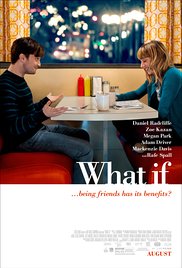
WHAT IF…?
Canada/Ireland, 2013, 98 minutes, Colour.
Daniel Radcliffe, Zoe Kazan, Megan Park, Adam Driver, Mackenzie Davis, Rafe Spall.
Directed by Michael Dowse.
What if…? is a romantic comedy from both Canada and Ireland, the main action set in Canada with a visit to Dublin in the middle of the film. It was originally called The F Word but this was not acceptable for release in the United States.
It is the story of Wallace, a British medical student in Canada, played by Daniel Radcliffe, lookinga little like Harry Potter grownup, who suffered a romantic breakup. At a party, he encounters a lively young woman, Chantry, Zoe Kazan, and they strike up a friendship, but he is little taken aback to find that she has been in a five-year relationship with Ben, a UN expert, played by Rafe Spall. Adam Driver plays Wallace’s roommate.
The characters are quite well drawn, both Canada and Dublin look rather good, there is some witty dialogue, there is a picture of a friendship which eventually the two friends realise is love.
1. A popular romantic comedy, for a 20-something audiences? Canadian setting, visit to Ireland? British characters in Canada?
2. The title? Possibilities? (The alternate title of The F Word?)
3. The Canadian settings, the city, apartments, animation offices, hospitals? The visit to Ireland? Dublin and locations? The musical score?
4. The introduction to Wallace, his breakup, sitting on the roof, sad, his sister and nephew and his links with them, his British background, medical studies, dropping out? His prospects? Sharing an apartment with Allan?
5. The party, with Allan, meeting Chantry, Allan’s cousin? Talking, at ease with each other, and easy friendship? Exchanging phone numbers? Wallace not following through? The chance meeting outside the cinema?
6. Chantry, revealing her relationship with Ben? Five years? Living together, love? Ben’s character, work for the United Nations? His prospects? His manner, at home with Chantry? The invitation for Wallace to come to the meal, edgy situation for him, Ben and his reaction, the touch of superiority, the accident, his falling out the window, in hospital? Recovery?
7. Meeting his former girlfriend at the hospital?
8. Chantry and her animation work – and the touches of animation throughout the film, humorous touches, light and characters?
9. Wallace, his sister, nephew, their talks, their support of him, his needs?
10. Chantry, her concerns, Ben going to Ireland, the contact, her being offered the animation job in Taiwan? The continued meetings with Wallace, talking things over, friendship? Chantry’s sister, sexy approach, Wallace resisting?
11. Allan, meeting Nicole, Nicole and her friendship with Chantry, hitting it off with Allan, marriage, pregnancy?
12. Chantry going to Dublin, surprising Ben, his work, friendships, the woman from the embassy, his taking on more jobs? Chantry and her disappointment, coming home?
13. Wallace, the decision to go to Canada, the encounter with Ben, his being punched out, learning that Chantry had returned home, his returning?
14. Chantry and Wallace, her reactions, a possible split, yet the love for each other, the reconciliation? The background of the Fool’s Gold loaf, and each making it for the other at the end?
15. The aftermath, Chantry going to Taiwan for her career, Wallace studying medicine, marriage – and a future?
Published in Movie Reviews
Published in
Movie Reviews
Tagged under
Saturday, 18 September 2021 20:00
Kung Fu Panda 2
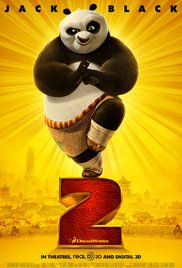
KUNG FU PANDA 2
US, 2011, 91 minutes, Colour.
Voices of: Jack Black, Dustin Hoffman, Angelina Jolie, Gary Oldman, Jackie Chan, Seth Rogen, Lucy Liu, David Cross, James Hong, Michel Yeoh, Danny Mc Bride, Dennis Hayesbert, Jean- Claude van Damme, Victor Garber.
Directed by Jennifer Yuh Nelson.
Kung Fu Panda entertained millions of children and adults, a large panda, fond of eating and a touch lazy, was transformed into an action hero, despite himself. Voiced in his characteristic American voice, he made Po the panda, a comic creation, listening to his master (Dustin Hoffman) and surrounded by his fellow action characters (voiced by Angelina Jolie, Seth Rogen, Lucy Liu, David Cross and Jackie Chan).
Well, they are all back. Certainly, the novelty has gone but, despite the hustle and bustle, this sequel lacks the oomph of the original. No particular reason to see it, except to form a re-acquaintance with the familiar names and places.
The addition this time is a villainous peacock, Shen, who defies his parents, is exiled and makes plans to become the Emperor of China. He has a squad of goons and is involved in stealing metal to melt and mould into weapons.
For the most part, this is Po trying to find out about his parents after he realises that Mr Ping is not his real father and the battle between Po and Shen, lots of shenanigans, of course, entertaining but not so memorable.
Gary Oldman is the voice of Shen and there are cameo voices from Michelle Yeoh, Jean Claude Van Damme, Danny McBride?, Dennis Haysbert, Victor Garber. My favourite is Po’s father, the noodle-making Mr Ping, the goose who adopted Po, voiced by James Hong, who is worried about Po learning about his past and greatly relieved when Po returns home.
1. The popularity of the original Kung Fu Panda? The Chinese locations, the characters, especially Po and his family? The range of friends and associates? Martial arts? The training from Master Shifu? The battles?
2. The reprising of this in the sequel? The continued appeal?
3. The animation, bright and colourful, the background locations, an atmosphere of China? The delineation of the characters? Po, his friends and the variety, the Peacock and his entourage?
4. The strength of the voice cast?
5. The action sequences, choreography of the battles? The musical score?
6. The introduction of the Peacock, his family, his ambitions, appearance, domination, travels, overcoming difficulties, building up of his following, claims?
7. The Peacock as the villain, tyrant, wanting domination? To make the weapons, the collecting of metals, the henchmen arriving at the time, the confiscations? The making of the weapons? Terrorising the people in the village?
8. Po, the details of his friends, their, styles, manner of speaking?
9. His father telling him that he was adopted, the effect on, Po, his memories, wanting to find his actual father? The devotion of Mr Ping? His gifts and sending Po on his way to battle?
10. Po and his sense of mission, training, Master Shifu, the encouragement?
11. The fight, the choreography and action? Po and his techniques, overcoming the Peacock?
12. His return, celebration – and the possibility of further adventures for Po and his discovery of his family and village?
Published in Movie Reviews
Published in
Movie Reviews
Tagged under
Saturday, 18 September 2021 20:00
Allegiant
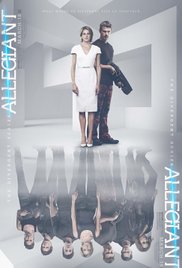
ALLEGIANT
US, 2016, 118 minutes, Colour.
Shailene Woodley, Theo James, Naomi Watts, Octavia Spencer, Jeff Daniels, Zoe Kravitz, Ansel Elgort, Miles Teller, Maggie Q, Bill Skarsgaard, Jonny Weston.
Directed by Robert Schwentke.
We are at chapter 3 of Veronica Roth’s Young Adult series. Her third book has been divided, as with the film versions of Twilight, Harry Potter, The Hunger Games into two films. We understood what Divergent could mean as well as Insurgent. And the fourth film is to be called Ascendant. But, what does Allegiant actually mean – who is or are allegiant and to what?
The series is set in a post-Apocalyptic world (and, for some of us, we might become a little mixed-up with those worlds of The Hunger Games, of The Giver, of The Maze Runner because of similarities). In the ruins of Chicago, five factions lived side-by-side, each with particular qualities – but, with the emergence of Tris, a Divergent, things became unsettled, especially for the governing personality, Janine (Kate Winslet) and those who did her bidding, trying to establish supremacy among the factions.
Tris (Shailene Woodley with a strong screen presence, great physical agility, and intelligence) encountered Four, Tobias (Theo James) which led to a revolt against Janine and her brutal attempts at putting down the uprising, insurgency The rebels conquered with the new leader, Evelyn (Naomi Watts, off-puttingly unrecognisable in a brunette wig, the mother of Tobias whom she had abandoned as a child and had joined the rebels.
This is where we stand at the beginning of Allegiant, with Evelyn presiding over trials and executions of Janine’s officials. Tris will not stand on the platform with her; Tobias tries to persuade his mother to rethink what she is doing; the leader of the opposition, Joanna (Octavia Spencer) stands but then leaves, drawing the discontented into a band for further stances, and they are the Allegiant.
But, surprisingly, this third film adds quite a deal more of plot. Four enables Tris’s brother, Caleb (Ansel Elgort) to escape and with Peter (Miles Teller), always fickle, a group goes to scale the wall which hems in Chicago and venture to find what is outside.
The wall-scaling is quite an exciting episode and the group find a no-man’s land of red radioactive waste but are suddenly rescued and welcomed by an alternate force from the Bureau, a complex and technological site where O’Hare? airport used to be. It has extraordinary technological developments and many comforts, and all kinds of surveillance techniques, even virtual presence, and know all about Chicago and the factions. It is all presided over by David (Jeff Daniels) who is interested especially in Tris and her being so unique, as a Divergent. He has been eager for her to come so that he can do contact genetic testing – with the alleged aim of improving all the humans whom he sees as “damaged”. Tris, Who is shown video of her mother and herself as a child, is persuaded by him but Tobias is not.
This leads to a number of dramatic crises, Tobias discovering where the Bureau gets its children from, raids on The Range. Tris is taken before the Council and learns David’s true motivations and his role as an overseer of the Bureau and its surveillance of Chicago.
The important thing is to get back to Chicago, to try to persuade Evelyn about what is happening – but, of course, Peter then does a deal and plays the role of the betrayer once again. The Allegiants will have to make a decision as to where they stand and Tris accuse a rousing speech, her image playing in the huge skyscraper walls.
Yes, quite some developments of plot – and, at this knife-edge, the final credits, and we anticipate the wait for Ascendant.
1. As a chapter in the series on its own? As the third in the series of four? Continuity, development?
2. The title, the tone? Allegiant and the rebel group, led by Joanna?
3. The sets, Chicago and its ruins, the area of the factions, the inner building, technology and control? The wall? The radioactive red territory? The Bureau? The architecture, technology, helicopters and planes? The Fringe? A post-apocalyptic world?
4. Audience knowledge of the previous films, the factions, the different styles, coexistence, the control over them? The role of Janine? Her clash with Tris? The confrontation with Evelyn? The rebels, Janine defeated?
5. The execution of Janine’s loyal officials? The crowd, the shouting, the bloodlust? Evelyn, having to make the decisions, her motivations? The appeals from Tobias, Tris not going on the platform? The use of the truth serum? The lieutenants, telling the truth about wanting to kill, despising people, yet not wanting to die, being shot? The others? Tris and Caleb, his betrayal? Imprisoned? Tobias and his authority, leading Caleb to freedom, in the vehicle, at the gate, Tori and the authorisation, Peter and his threats, Christine? All in the vehicle, driving towards the wall?
6. The visuals of the wall, height, escaping it, the electric wire, the falls, Tris and her running to the control, the explosion and disabling the electricity, being shot at, the explosion and Edgar being wounded? Tori and her being shot?
7. Getting down the wall, the ugly terrain, radioactive, walking, the confrontation, the plains, the barrier and its opening, their escape, the group being welcomed at The Bureau?
8. Tris as perfect, Divergent and unique, as a saviour, her being studied, the genetic hopes?
9. The Bureau, the community, in uniforms, the technical developments, the officials, but no children except for those taken in the raids on The Fringe? The look, the labs, the capacities for surveillance? Peter and Caleb and their job? Tobias and his love for Tris, not allowed to the tower? The surveillance and knowing all about what was happening in Chicago, the possibility for a virtual presence?
10. The cleansing, the bar on the wrist, the new clothes, the reassurances? The role of Matthew?
11. Tris, in white, invited to the tower, Matthew as escort, meeting David, his age, experience, the luxury of the tower, his being the overseer, his eagerness about the experiments, knowing all about Tris? Conducting the investigations and tests?
12. David and his manner, able to be trusted? His explanations? Tris as perfect, everybody else as “damaged”? The studies, wanting to reproduce the results and fix everyone, the humanitarian aims? genetic experiments? Tobias, going to the tower, Tris believing David? The flight to the Council? The interview, Tris learning David’s role, the control of the Council, David wanting the grants, the reaction of the Council?
13. Caleb, observing, his capacity for helping, his technical knowledge, keeping the connections?
14. Tobias, being taken to the Fringe, the kidnapping of the children, Tobias and his reaction? His wanting to go to Chicago after clashing with Tris? In the plane, Matthew accompanying him, the crash of the plane, Matthew going back with the story and Tobias not surviving? Tobias, wounded, his being taken to Evelyn, Tobias and his relationship with his mother, the past, challenging her? Evelyn going to her husband, the truth mask and his truth?
15. In Chicago, Evelyn, in command, succeeding Janine, the talk that she was becoming dictatorial like Janine? The soldiers, the factions? The group of the allegiant young people? Joanna and her leadership, the clash with Evelyn, walking out, preparing to fight?
16. Tris, in the plane, with Christina, guided by Caleb?
17. David, his plans, deadly intentions, his surveillance, virtual presence in Chicago and watching? His tempting Peter, the deal? Peter, his past and betrayals? His going to Evelyn, David’s proposal, the mask, the serum, producing it, its beginning to suffuse the building,
Chicago, affecting the crowds?
18. Tobias, the rescue, moving out of prison, fighting, reunited with Tris? Peter and his fears, locking himself in, being forced to unlock? Evelyn being shot?
19. Caleb, his advice, technical know-how, David cutting the connection?
20. Tris, knowing the source, going down, the basement, the corridors, David confronting her? Her using her wits, shooting through the wall, stopping the serum?
21. Peter, his escape, in the radioactive area, abandoned?
22. Evelyn and Joanna uniting, the leadership of the Allegiant group, preparing to make a stand?
23. The retrospective on the factions, Tris and the video of her mother and her origins, her being rescued? Identifying with her mother? Divergent, the others as damaged? The encounters with Tobias, the role of the villain?
24. Tris, her speech proclaimed on the walls, urging for unity rather than division? Survival and the sequel?
Published in Movie Reviews
Published in
Movie Reviews
Tagged under
Saturday, 18 September 2021 20:00
Silent Hill: Revelation 3D
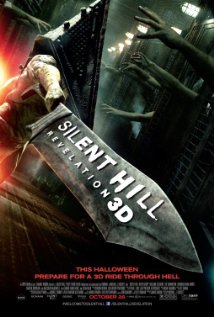
SILENT HILL: REVELATION 3D
US, 2012, 93 minutes, Colour.
Adelaide Clemens, Kit Harrington, Carrie- Anne Moss, Sean Bean, Radha Mitchell, Malcolm Mc Dowell, Martin Donovan, Deborah Kara Unger, Robert Campanella, Erin Pitt, Peter Outerbridge.
Directed by Michael J.Bassett.
The original Silent Hill, based on a game, is an eerie trip into a world of the demonic.
This sequel takes place some years later, the focus on the young Heather, Adelaide Clemens, travelling with her father, Sean Bean, who says that her mother has been killed but is, in fact, trapped in Silent Hill (Radha Mitchell).
Heather encounters a young student, Kit Harrington (Game of Thrones, Pompeii) who offers to help her but is, in fact, the son of the head of Silent Hill, Claudia, Carrie Anne Moss. A lawyer, Martin Donovan, is hired by Silent Hill but offers to help her – but is later killed, with police suspecting Heather. Heather has a great number of sinister adventures including going to visit the grandfather, played by Malcolm Mc Dowell.
The film has an eerie tone, dark sets for the demonic world – and is able to stand by itself without audiences having seen the original film.
1. The impact of the original filling? The relationship with the game? Plot, characters?
2. United States setting, ordinary, sinister, demonic? The musical score?
3. Sets and decor, evil settings? Action and special effects?
4. Heather and Harry, travelling, the disappearance of Rose? Her being kept in Silent Hill? Heather believing her mother had been killed? The cult, protection? The talisman and her having half?
5. Heather, the effect of the past, dreams and hallucinations?
6. Vincent, teenager, a school student, befriending Heather, keeping her company?
7. The arrival of Douglas Cartland, the confrontation, his being hired by the community, his change of heart and decision to help Heather? Heather’s reactions, her warning Harry, the abduction?
8. The Monster killing Douglas? Heather going back into the real world, suspected for Douglas’s murder?
9. Vincent, escort, his relationship to his mother, the head of the cult, Claudia? The young Alessa and death, consequences?
10. The Missionary, Vincent, the information about his grandfather, Dahlia and their warnings? Going to meet Leonard, the seal, taking the half of the talisman, Leonard becoming a monster?
11. Pyramid Head, shadowing Heather, Vincent taken, saved?
12. Alessa, the wrath of Claudia, the fusing of the older and younger?
13. Claudia, Heather and Vincent as hostages, giving the seal to Claudia, the escape?
14. Harry, escaping, being able to free Rose?
15. Vincent and Heather, on the road, the return of Travis (from the first film) the police, being saved?
Published in Movie Reviews
Published in
Movie Reviews
Tagged under
Saturday, 18 September 2021 20:00
Bobby Fischer: Against the World
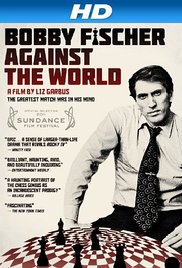
BOBBY FISCHER AGAINST THE WORLD
US, 2011, 93 minutes, Colour.
Directed by Liz Garbus.
This is a very interesting documentary, made by celebrated producer and director, Liz Garbus, whose films included Love, Marilyn and What Happened, Miss Simone?
By the 1970s, chess champion Bobby Fischer had a worldwide reputation, and 1972 saw his competing with Russian, Boris Spassky, for the world championship.
However, Fischer was an eccentric personality. His mother was a card-carrying communist and there are many visuals of her protests and campaigns. The family was on the move, with him as a loner, and he became interested in chess at the age of six, committed to it by the age of seven, practising, with an ability to look at illustrations of games and understand how they were played, going on tour to play a range of players at a time, chaperoned by his sister. By age 15, 1958, he was appearing on television shows and being interviewed.
Liz Garbus has assembled quite an extraordinary amount of historical footage, including a number of interviews with Fischer himself, with friends and advisers, with chess experts, with the celebrities, and even with Henry Kissinger who ordered him to go to Iceland in 1972. There is also historical footage of the period, with Nixon in the US, Brezhnev in the USSR, and the 1972 worldwide watching of the competition on television.
Fischer was an eccentric personality, making all kinds of demands on the Icelandic authorities (footage of them appears – at the time and then later when they welcomed him to Iceland when the US had cancelled his American citizenship). He was erratic about coming to Iceland, persuaded by his friends, behaving eccentrically when there, especially in the games, but ultimately winning.
The film also shows life after winning, his unwillingness to play for the challenge to his world championship, his being caught up in the Church of God, becoming anti-Semitic in his utterances, persuaded by young Hungarian woman to compete against Boris Spassky in Yugoslavia in 1992 which led to the American government ban. He continued to badmouth the American government and finished up in Iceland where he alienated many people, dying in 2008.
The comments on his mental condition, his psychological problems are helpful – and the speculation about whether he would have been such a chess genius had he not been so eccentric and mentally unstable.
1. A quality documentary? Acclaim? The work of the director and her wide range?
2. Audience knowledge of Bobby Fischer, his origins, his career, his genius with chess, his competitiveness? His early years, his peak? And the aftermath and his being on the run? Disappearing?
3. The combination of historical footage, the range of interviews in talking heads, their links with Bobby Fischer, chess champions, collaborators, friends, his brother-in-law, experts, the personalities in Iceland in the 1970s and later, supervisor, grandmaster, chauffeur? The TV celebrities in the shows? The range of chapters? The indicating the footage and the interviews? The musical score?
4. The portrait of Bobby Fischer, American, born in 1943, Jewish background, his mother and her communist membership, seeing her in protests, in interviews, his separation from his mother? His sister, helping him when young, the tours, her brother-in-law? Continuing on the move, not having a childhood, aged six and chess, serious at seven, his training, spending the hours practising? The television interviews, at 15? The celebrities having him on their show and the questions? His study of chess magazines, ability to look at the games and work out in his head how they were played? His becoming a champion, on tour playing many people at the same time, the cash, his sister chaperoning him, the absent mother? Alone, and not really having a childhood?
5. The interviews at the time, on television when he was 15, later interviews when he was a champion? The interviews in 1972? Seeing his appearance, his age, growth, becoming a celebrity? The photographer and so many photos of him, especially in the 1970s – and their use in the film?
6. 1972, the Cold War, the images from the Soviet Union, the focusing on chess, becoming a national sport? The investment in Russians playing chess? Boris Spassky, world champion, the challenge? The images from Russia, Brezhnev, USA and Nixon? The authorities? The interventions by Henry Kissinger – and the interviews in his later life?
7. Spassky ready, going to Iceland, the room, his chair, waiting, pressing the button for the first game, forfeited?
8. Bobby Fischer, moody, alienating people, not wanting to go? The discussion of the terms, not wanting to be in Iceland, conscious of people following him? The discussions about the prize money? Further conditions? At his friends house, the friend’s father dying – and Fischer absentmindedly saying he didn’t mind? The pressure to go, his arrival, the airport, hurrying into the car, the crowds? Alone in the countryside? Not showing up? The variety of games, the forfeit, the draws? His reactions, suspicion about rays, the noise of the cameras, the whole room examined? The audience watching on screens outside?
9. The experts, the comments on Fischer as a champion, his games, the beauty of his games?
10. His physical trainer, the energy in training, his ambitions, his skills?
11. The audience on television, on American news, politics – and population? The patriotic support? His victory?
12. The scenes in Iceland, the authorities, the financial situation, the pressures? Their being interviewed 30 years later, especially with
Fischer settling in Iceland?
13. The aftermath, a certain emptiness after achievement, the possibility of defending his title against Kasparov, his fears, no show?
14. The religious background, the Church of God, its influence, the comments from his physical trainer and his being a member of the church, the television scenes with the founder of the Church, Fischer and his life, withdrawn, the anti-Semitic tone of the church, expectations of the second coming, the failure of the prophecy, Fischer and his leaving the church?
15. Zita, from Hungary, contacting Fischer, urging him to play, the 1990s, the challenge with Spassky, both past their peak, the game in Yugoslavia, the war, the American, his spitting at the document, his further talk about the CIA and plots, his becoming anti-American? His winning again Spassky?
16. His continuing to move, not having a homeland, the invitation to Iceland, the welcome, contacting his old chauffeur, the chauffeur making a documentary and clips from that film?
17. In Iceland, the welcome, television interviews, the interviewer who said that the interview proved that his father’s comments about his not being sane? Alienating people? Psychological difficulties? The walks and talks with the psychologist? The interviews with the psychologist?
18. Fischer, mental illness, the diagnoses? The fact that he was a genius – the touch of madness which enabled him to achieve as a
genius?
19. The film as a significant piece of 20th-century Americana?
Published in Movie Reviews
Published in
Movie Reviews
Tagged under
Saturday, 18 September 2021 20:00
Homegrown
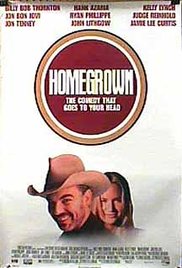
HOMEGROWN
US, 1998, 10 minutes, Colour.
Billy Bob Thornton, Hank Azaria, Ryan Philippe, John Lithgow, Kelly Lynch, Jon Bon Jovi, Judge Reinhold, Jon Tenney, Jamie Lee Curtis, Ted Danson.
Directed by Stephen Gylenhaal.
Homegrown is a comedy with serious touches, a 1990s film (although written earlier) about marijuana crops grown illegally in Northern California, the cultivation, processing, deals with private customers, the influence of big business and the Mafia.
Billy Bob Thornton, Hank Azaria and Ryan Philippe play three of the growers, not the smartest of growers, who work well with one another but not without some bickering. Kelly Lynch is their contact in the town, a strong-minded woman who understands the market – and who has a sexual relationship with each of the men.
When their boss, John Lithgow, is killed by his helicopter pilot, they began to panic, then decide to go into business on the run, which gives them some dangerous experiences, collecting the marijuana, going to visit potential customers, including Jon Bon Jovi, contact with the people in the town, including Jamie Lee Curtis, paying off a corrupt cop, Judge Reinhold, and eventually Billy Bob Thornton impersonating the dead businessman and business contacts for further markets and being grilled by the Mafia chief played by Ted Danson.
So, quite a considerable cast, and jokey screenplay about marijuana and its legality or not, and a number of points being made about cultivation.
Directions by Stephen Gyllenhaal and there are small parts for his children, Maggie and Jake.
1. A serious comedy? Americana, and trends, the law, business connections, sales and deals, the Mafia?
2. North Carolina, mountains and forests, the towns, marijuana crops, the huts, the clubs, customers, offices? The musical score and songs connected with marijuana?
3. The title, the crops, the sales, processing, the law, money, corrupt police?
4. Malcolm, his business, his control of the crops, introduction, his business deals, his private shooting him, the three men seeing it and fearful? His later appearance – but his twin brother, the threats, the relationship with their mother? Jack and his impersonations of Malcolm?
5. The three men, death, the panic, moderate intelligence, planning, fears, taking charge of the crops, taking the drugs, looking for customers? The walker in the woods, get him to help, the gun, his being undercover? Their reactions, fears, fleeing, getting tangled in the woods?
6. Lucy, strong personality, control and the decision-making, wary, the discussions and plans , the sexual relationship with each of them? Discovering the truth, collaboration?
7. Sienna, at the dance, the relationship with the three, the knowledge about the town, the drugs?
8. Danny, Jon Bon Jovi, customer, the meetings, discussion or the girls and the sales?
9. Other businessmen, checking their contacts, Jack and his impersonations? His skills?
10. The Mafia contacts, the Mafia chief, the meetings, the angers, his impersonation – and the result?
11. The corrupt policeman in the town, buying him off?
12. The three, coming good, the money, the drugs? The confrontation by the twin brother?
13. Tongue-in-cheek look at drugs, the perspective of the late 1990s, the touch of sardonic humour, the ending?
Published in Movie Reviews
Published in
Movie Reviews
Tagged under
Saturday, 18 September 2021 20:00
Big Game/ 2015
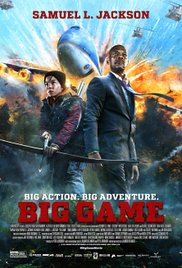
BIG GAME
Finland/Germany/US, 2015, 85 minutes, Colour.
Samuel L.Jackson, Onni Tommila, Ray Stevenson, Victor Garber, Mehmet Kurtulus, Ted Levine, Felicity Huffman, Jim Broadbent.
Directed by Jalmari Helander.
Big Name is an old-fashioned adventure film, from a story by the Finnish director.
It is reminiscent of such adventures as Air Force One in the 1990s and is a cousin of such threats to the presidency films as Olympus is Down and London is Down where the intentions of the terrorists are rather similar to those here.
The scenery in Finland, the mountains, the forests for hunters, are quite spectacular and provide plenty of obstacles for the rescue of the President. At the centre of the film is a young boy, turning 13, Onni Tommila, being sent out into the forest to kill his first animal, but finding that he is not adept with his bow and arrows.
The American President is flying in Air Force One to a conference in Helsinki. An alleged hunting helicopter is carrying terrorists who shoot down the plane and those accompanying it. The serious chief of staff, Ray Stevenson, turns out to be the traitor, disgusted with a weak Presiden and sends the President in a safety pod intending to sell him to be terrorists and execute him.
But he is found by the boy who helps him – they find themselves in a freezer taken by helicopter but the boy cuts the connection and they fall to earth, rolling down cliffs into lakes, finding the crashed plane, using ejection seats to escape. Meanwhile, there are confrontations with the chief terrorist and the security head.
Samuel L. Jackson seems to be enjoying himself as a weak President who becomes strong, and acts very well with the boy who has a fine command of English. The character actors in the Pentagon include Vincent Garber as Vice- President, Ted Levine as the general, Felicity Huffman as the CIA chief and, especially, Jim Broadbent is also enjoying himself as an expert – with a twist at the end.
Saturday matinee kind of stuff – implausible but enjoyable.
1. A popular action show? Based in realism but far-fetched?
2. The Finland setting, the beauty of the scenery, the mountains, the lakes? The Washington setting, the Pentagon? The hunting action, in the forest, the President and the boy being pursued? The base camp, the hunters? The helicopter, Air Force One and its interiors, the crash? The musical score?
3. The plausibility of the plot, implausibility and plausibility – and that not mattering for the action and entertainment?
4. In Finland, the young boy, turning 13, the photo of his father with the bear, the challenge to the boy? His wanting to live up to his father, admiration for his father? At the camp? Unable to fire the arrow, his embarrassment? His father supporting him, pressurising the leader? The quest, overnight, to bring back an animal, a deer?
5. The boy out overnight, camping? His coming across the pod, thinking the President came from space, his questions? Opening the door with the code? His arrow, the confrontation?
6. The President, head of security, the detail of Air Force One, the President going to a conference in Helsinki? The President laid back, eating the cookies, the attention of security? The attack, the plane hit, the President in the pod, the betrayal of the head of security, in the past his having been wounded for the President? His shooting the men, parachuting?
7. The men in the helicopter, the leader from the Gulf States, landing, setting themselves up, glasses, the weapons, and ordering the pilot to run, destroying him?
8. Meeting with the security chief in the forest? Tracking the pod, the President missing, finding the boy, finding the President, taking him, in the freezer, the security chief killing two of the men? The helicopter, towing the freezer, the boy leaping onto it, their trying to shoot him, going low in the forest, bumping, the boy cutting the rope, landing with the President in the freezer? Getting him out? The issue?
9. The attack, bumping the freezer, its going downhill, into the water, finding the crashed plane, going inside, the leader getting into the plane, putting the bomb, the President and the gun and cocking it (after his attempt to shoot the security chief), the ejection seats, into the water? Landing near the base camp?
10. The plane, the rescue of the security chief, the boy’s arrow bouncing off him – but upsetting the bullet already within him and his death?
11. The Pentagon, the Chiefs of staff, the CIA head, the Vice President? Bringing in the expert on terrorism? His casual approach, eating the sandwich, his knowledge, information, getting the satellite focus, everybody being able to follow what was happening? The amazement? Losing the President the expert urging Vice President to be sworn in? And the President appearing?
12. Hunters, the puzzlement, the SEAL rescuing the President, the men and hands up, the boy, his father, having provided the deer’s head in the freezer, but the boy wanting to stand on his own feet? The newspapers, with the photo with the President and his medal?
13. The revelation that the expert and the Vice President had engineered the attack on the President, the expert and Vice President in the toilet block and going, scot-free?
14. A boy’s own adventure?
Published in Movie Reviews
Published in
Movie Reviews
Tagged under
Saturday, 18 September 2021 20:00
Secret of Kells, The
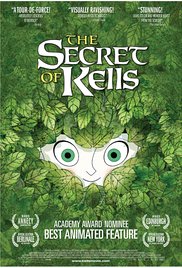
THE SECRET OF KELLS
Ireland, 2009, 75 minutes, Colour.
Voices of: Evan Mc Guire, Brendan Gleeson, Mick Lally, Christen Mooney.
Directed by Tomm Moore.
The Secret of Kells was a nominee for Oscar for best animation in 2009. It has a very distinctive animation style, full of colour and light, drawing inspiration from the books of illumination of manuscripts, including the Book of Kells. The characters are quite stylised, especially in the delineation of faces, facial parts, height and width. And the voices are very distinctively Irish, with Evan Mc Guire as the young brother Brendan, Brendan Gleeson as the Abbott, Mick Lally as the artist, Brother Aidan, and Christen Mooney as the mysterious young woman of the forest, Aisling.
The film was directed to younger audience, perhaps something like Kells for Kiddies, an opportunity to communicate something of Irish monastic history and the history of illumination to the young, introducing them to monastic history and medieval themes.
After an introduction to the history of the period, spoken rather indistinctly by the hero, the film opens out to a more straightforward narrative. Brendan is young man in the monastery, the nephew of the Abbott, interested in illuminated manuscripts but thwarted in his intentions by the Abbott who is concerned about the invasions of the Norsemen and on building a wall of fortifications, even though he was an illuminator in the past.
Brother Aidan who had eliminated a Book of Iona comes to the monastery to continue his work and begins his illumination of a book for Kells. Brendan is eager to help and is commissioned to collect berries for extracting juice for inks, entering into the forest which had been forbidden. He meets a wraith-like one girl, Aisling, who helps him in his quest. Also in the action is the monastery cat.
Aidan shows Brendan the process of mixing inks for a variety of colours. The Abbott discovers what has happened, he puts ban on Brendan’s going out which Brendan refuses.
Also in the action is the design of the star which is to become part of the elimination.
Ultimately, Brendan perseveres with his work, Aidan completes his work of art. Brendan grows older as does the Abbott, the Abbott relenting and their admiring the pages of the book, some of which in their design are reminiscent of the life of the monastery, beautiful in colour and design.
Perhaps adults not familiar with this Irish history may find it helpful and enjoyable as well.
Published in Movie Reviews
Published in
Movie Reviews
Tagged under